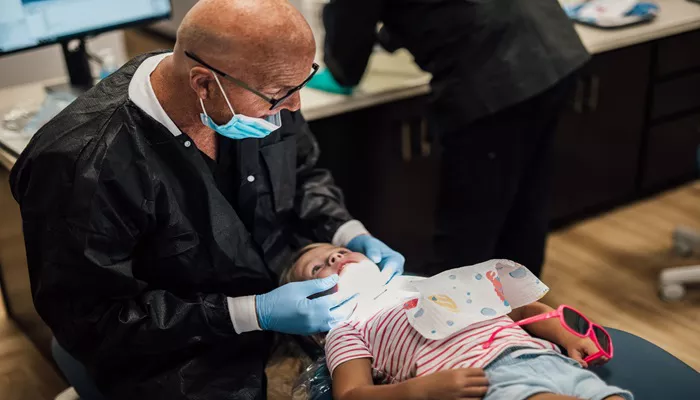When it comes to your child’s dental health, choosing the right dentist is crucial. Many parents wonder whether to take their children to a general dentist or a pediatric dentist. While both types of dentists provide essential dental care, pediatric dentists specialize in treating children. This article will explore the reasons why choosing a pediatric dentist is often the best option for your child.
Understanding the Role of a Pediatric Dentist
1. Specialized Training
Pediatric dentists complete additional training beyond dental school. After earning a dental degree, they undergo two to three years of specialized training in pediatric dentistry. This training focuses on:
- Child development
- Behavior management
- Pediatric dental procedures
This specialized education equips pediatric dentists with the skills needed to address the unique dental needs of children.
2. Focus on Children’s Oral Health
Pediatric dentists are dedicated to the oral health of children from infancy through adolescence. They understand the specific dental issues that can arise at different stages of development. Their training helps them provide tailored care for:
- Teething infants
- Children with special needs
- Adolescents undergoing orthodontic treatment
Child-Friendly Environment
1. Welcoming Atmosphere
Pediatric dental offices are designed with children in mind. They often feature colorful decor, toys, and child-sized furniture. This welcoming environment helps to reduce anxiety and makes dental visits more enjoyable for young patients.
2. Friendly Staff
The staff in pediatric dental offices are trained to work with children. They know how to communicate effectively with young patients and help them feel comfortable. This friendly approach can ease fears and create a positive dental experience.
Expertise in Behavior Management
1. Understanding Child Behavior
Pediatric dentists are skilled in managing the behavior of children during dental visits. They use techniques to help children feel at ease and cooperate during examinations and treatments. This expertise is especially important for:
- Anxious children
- Children with special needs
- First-time dental patients
2. Techniques for Comfort
Pediatric dentists often employ various techniques to make dental visits less stressful. These may include:
- Distraction methods, such as toys or videos
- Positive reinforcement, like stickers or small prizes
- Gentle communication to explain procedures in simple terms
Comprehensive Dental Care for Children
1. Preventive Care
Pediatric dentists emphasize preventive care to maintain your child’s oral health. This includes:
- Regular check-ups
- Cleanings
- Fluoride treatments
- Sealants
Preventive care helps to catch potential issues early and reduces the risk of cavities and other dental problems.
2. Education for Parents
Pediatric dentists provide valuable education for parents on maintaining their child’s oral health. They offer guidance on:
- Proper brushing and flossing techniques
- Nutritional advice for healthy teeth
- Tips for managing dental anxiety
This education empowers parents to take an active role in their child’s dental care.
Treatment of Dental Issues
1. Early Detection of Problems
Pediatric dentists are trained to identify dental problems early. They can spot issues such as:
- Cavities
- Misaligned teeth
- Oral diseases
Early detection allows for timely intervention, which can prevent more severe problems later on.
2. Specialized Treatments
Pediatric dentists offer specialized treatments tailored to children’s needs. These may include:
- Silver diamine fluoride for cavities
- Space maintainers for children with missing teeth
- Orthodontic assessments and treatments
These specialized services ensure that your child receives the best possible care for their developing teeth.
Comfort with Dental Procedures
1. Sedation Options
Pediatric dentists are experienced in providing sedation options for children who may be anxious about dental procedures. These options can include:
- Nitrous oxide (laughing gas)
- Oral sedation
- General anesthesia for more complex procedures
These methods help ensure that children remain comfortable and calm during dental treatments.
2. Minimally Invasive Techniques
Pediatric dentists often use minimally invasive techniques to treat dental issues. These techniques can reduce discomfort and speed up recovery time. For example, they may use laser dentistry for certain procedures, which can minimize pain and bleeding.
Long-Term Relationship
1. Continuity of Care
Choosing a pediatric dentist allows for continuity of care as your child grows. Pediatric dentists can monitor your child’s dental development over the years. They can address any changes or issues that arise as your child ages.
2. Transition to Adult Dentistry
When your child reaches adolescence, a pediatric dentist can help transition them to a general dentist. They will ensure that your child is prepared for adult dental care and can provide recommendations for trusted general dentists.
Conclusion
Choosing a pediatric dentist instead of a general dentist offers numerous benefits for your child’s dental health. From specialized training and a child-friendly environment to expertise in behavior management and comprehensive care, pediatric dentists are uniquely equipped to meet the needs of young patients.
Regular dental visits to a pediatric dentist can help establish a positive attitude toward oral health, ensuring that your child maintains healthy teeth for life. If you have any questions about your child’s dental health or need assistance finding a pediatric dentist, don’t hesitate to reach out to your family dentist or local dental association for recommendations. By prioritizing your child’s dental care, you are investing in their overall health and well-being.
Related topics:

